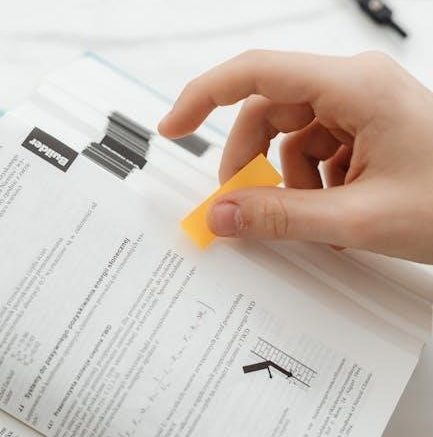GCSE Maths revision books are essential resources, offering comprehensive coverage, practice questions, and clear explanations. Available as PDFs, they provide convenient access to structured study materials.
1.1 Importance of Revision Materials for GCSE Maths
Revision materials are crucial for GCSE Maths preparation, providing structured study plans, practice questions, and clear explanations. They help students grasp key concepts, identify weak areas, and build confidence. Accessible as PDFs, these resources offer flexibility, ensuring effective study habits and better exam performance.
1.2 Overview of Popular GCSE Maths Revision Guides
Popular GCSE Maths revision guides, such as the Oxford Revise and CGP series, are widely used for their comprehensive coverage and clarity. These guides often include practice questions, worked examples, and concise notes, making them invaluable for structured study. Available as PDFs, they offer convenient access to essential revision content.
Key Features of a Top-Quality GCSE Maths Revision Book
A top-quality GCSE Maths revision book includes comprehensive curriculum coverage, practice questions, worked examples, and clear explanations. It offers structured content, concise notes, and accessible formats like PDFs for effective study.
2.1 Comprehensive Coverage of the Curriculum
A top-tier GCSE Maths revision book provides thorough coverage of the entire curriculum, ensuring all key topics are addressed. It includes detailed explanations, practice questions, and worked examples, aligning perfectly with exam requirements. PDF formats offer easy access, making it ideal for structured and efficient study routines.
2.2 Practice Questions and Worked Examples
Premium GCSE Maths revision books feature abundant practice questions and detailed worked examples, enabling students to apply theoretical knowledge. These resources mirror exam-style problems, helping students master various question types and build problem-solving confidence. PDF guides further enhance accessibility, allowing seamless practice anytime, anywhere, with clear solutions for self-assessment.
2.3 Clear Explanations and Concise Notes
Top-tier GCSE Maths revision books provide clear, concise explanations and summaries of key concepts. These resources ensure students grasp difficult topics efficiently. Notes are structured logically, with essential formulas and definitions highlighted, making revision straightforward and effective. PDF formats often include bullet points and visuals for enhanced understanding and quick reference.

Popular GCSE Maths Revision Books
Popular GCSE Maths revision books include Oxford Revise Edexcel, CGP Maths Revision Guide, and Pearson Edexcel resources. These books offer structured study materials, clear explanations, and practice questions, making them invaluable for exam preparation and effective learning.
3.1 Oxford Revise Edexcel GCSE Maths Higher Revision Guide
The Oxford Revise Edexcel GCSE Maths Higher Revision Guide is a top-tier resource, providing detailed explanations and practice questions tailored for higher-tier students. Its clear structure and comprehensive coverage make it an excellent choice for effective revision and exam success, aligning perfectly with the Edexcel curriculum requirements and student needs.
3.2 CGP GCSE Maths Revision Guide
The CGP GCSE Maths Revision Guide is a popular choice, offering comprehensive coverage of key concepts. With clear explanations, worked examples, and abundant practice questions, it supports both Foundation and Higher tiers. Its concise and structured approach makes it an ideal resource for focused revision, helping students achieve their best in exams.
3.3 Pearson Edexcel International GCSE Maths Revision Resources
Pearson Edexcel International GCSE Maths resources provide comprehensive coverage of the curriculum. Designed for the 9-1 course, these materials include structured revision guides, practice questions, and worked examples. Available in PDF formats, they offer clear explanations and support for both Foundation and Higher tiers, catering to diverse learning needs and exam preparation strategies.
How to Choose the Right Revision Book for Your Needs
Selecting the right GCSE Maths revision book involves aligning it with your exam board, checking the tier (Foundation or Higher), and ensuring clear, concise explanations with relevant practice questions.
4.1 Aligning the Book with Your Exam Board
Ensure your revision book matches your exam board (Edexcel, AQA, or OCR) for accurate content alignment. Check the ISBN and publisher details to confirm compatibility, as different boards have distinct syllabi and question formats. This ensures relevance and effectiveness in your study preparation.
4.2 Considering Your Maths Tier (Foundation or Higher)
Choose a revision book that aligns with your maths tier (Foundation or Higher). Foundation tier books focus on core concepts, while Higher tier resources cover advanced topics. Selecting the correct tier ensures relevance and avoids unnecessary complexity, optimizing your study materials for targeted revision and exam success.
4.3 Evaluating the Depth of Content and Clarity
Evaluate the depth of content and clarity in a revision book to ensure it meets your learning needs. Look for comprehensive coverage of key topics, clear explanations, and well-structured practice questions. Avoid overly simplistic or densely complex materials. The content should be concise yet thorough, making complex concepts accessible for effective revision.

Benefits of Using a Revision Book for GCSE Maths
Revision books enhance understanding, improve problem-solving skills, and boost confidence. They provide structured content, helping students grasp key concepts and excel in exams with clarity and precision.
5.1 Improved Understanding of Key Concepts
Revision books simplify complex topics, offering clear explanations and structured notes. They provide worked examples and practice questions, ensuring students grasp fundamental concepts thoroughly and apply them confidently in exams.
5.2 Enhanced Problem-Solving Skills
Revision books provide a wide range of practice questions and worked examples, helping students develop strong problem-solving abilities. Regular practice builds confidence and reinforces techniques, enabling learners to tackle diverse question types effectively and apply mathematical reasoning to complex scenarios.
5.3 Boosting Confidence for the Exam
Revision books play a crucial role in building exam confidence by familiarizing students with the format and content. Regular practice with past papers and structured guides helps reduce anxiety, allowing learners to approach challenges with greater self-assurance and a clearer mindset.

Effective Study Tips Using a Revision Book
Effective study involves creating a structured revision plan, focusing on weak areas, and practicing regularly. Use revision books to target specific topics, ensuring consistent progress and mastery of key concepts.
6.1 Creating a Structured Revision Plan
A structured revision plan ensures efficient use of time. Start by identifying key topics, breaking them into manageable sessions. Allocate specific times for each subject and topic, ensuring a balanced approach. Use revision books to guide your focus, setting achievable goals for each study session to maintain progress and consistency. Regularly review and adjust the plan to stay on track.
6.2 Focusing on Weak Areas
Identify your weak areas by reviewing past exams and seeking feedback. Use revision books to target these topics with tailored practice questions and detailed explanations; Set specific goals for improvement and track your progress. Regular review ensures lasting understanding and builds confidence in tackling challenging questions during exams.
6.3 Regular Practice and Review
Consistent practice and review are crucial for retaining concepts. Use revision books to access practice questions and worked examples. Set a schedule for daily review, focusing on understanding mistakes. Regular practice helps build fluency and confidence, ensuring you’re well-prepared for the exam. Combine with digital tools like PDF guides for enhanced revision.
The Role of Digital Resources in GCSE Maths Revision
Digital resources like PDF guides, online worksheets, and interactive tools enhance revision. They provide accessible, flexible learning options, supporting traditional study materials and promoting deeper understanding of key concepts.
7.1 PDF Guides and Online Worksheets
PDF guides and online worksheets offer structured revision materials. They cover key topics, providing clear explanations, practice questions, and worked examples. These resources are easily accessible, allowing students to revise efficiently and effectively, reinforcing their understanding of GCSE Maths concepts.
7.2 Interactive Tools and Video Tutorials
Interactive tools and video tutorials enhance learning by explaining complex concepts visually. They provide step-by-step solutions, allowing students to engage actively with problems. These resources complement traditional study materials, making revision more dynamic and effective for understanding GCSE Maths topics.
7.3 Apps and Online Platforms for Revision
Apps and online platforms offer interactive learning experiences, providing practice questions, video tutorials, and progress tracking. They cater to different learning styles, making GCSE Maths revision flexible and accessible. Popular platforms include those offering structured lessons and interactive activities to reinforce concepts and improve exam readiness.

Exam Strategies for Success in GCSE Maths
Effective exam strategies include managing time wisely, understanding question types, and using formulas provided. Practice past papers to enhance accuracy and reduce anxiety, ensuring optimal performance in GCSE Maths exams.
8.1 Time Management During the Exam
Effective time management is crucial for GCSE Maths success. Allocate equal time to each question, ensuring thorough answers without rushing. Use the first five minutes to read the paper and plan responses. Prioritize higher-mark questions to maximize scores and avoid running out of time for complex problems.
8.2 Approaching Different Question Types
Identify question types early, such as multiple-choice, word problems, or extended open-response questions. For each, apply appropriate strategies like formula usage or step-by-step reasoning. Practice various formats to build familiarity, ensuring clarity and structure in answers, especially for higher-mark questions requiring detailed explanations.
8.3 Using Formulas and Worksheets Effectively
Refer to formula sheets provided in revision books to ensure accuracy. Use worksheets to practice applying formulas to various problems. Show all steps clearly, even for simple calculations, to avoid errors. Regular practice with worksheets helps master formula application and improves problem-solving efficiency during exams.

Common Mistakes to Avoid in GCSE Maths Revision
Avoid overlooking key concepts, poor time management, and not seeking help when stuck. These mistakes can hinder progress and reduce confidence during revision and exams.
9.1 Overlooking Key Concepts
Overlooking key concepts is a common mistake, leading to poor exam performance. Ensure thorough revision of foundational topics like algebra, geometry, and statistics. Use revision books with comprehensive coverage, practice questions, and structured notes to reinforce understanding and avoid gaps in knowledge. Regular review helps maintain consistency and clarity in preparation. Avoid rushing through critical areas.
9.2 Poor Time Management
Poor time management during revision can significantly hinder progress. Students often spend too much time on familiar topics, neglecting weaker areas. Create a structured plan, allocate specific time slots for each subject, and stick to it. Regularly review progress to avoid last-minute cramming and ensure balanced preparation. Stay focused and avoid distractions to maximize efficiency.
9.3 Not Seeking Help When Stuck
Not seeking help when stuck can lead to persistent misunderstandings and poor exam performance. Use revision books, online resources, or study groups to clarify doubts. Don’t hesitate to ask teachers or peers for explanations. Addressing challenges early ensures a stronger grasp of key concepts and better overall results.

Supplementary Resources to Enhance Revision
Supplementary resources like past exam papers, online revision communities, and tutor support can complement your revision book. They provide diverse perspectives and additional practice, ensuring comprehensive exam preparation.
10.1 Past Exam Papers and Mark Schemes
Past exam papers and mark schemes are invaluable for familiarizing yourself with exam formats and question types. They allow you to practice under timed conditions, improving time management and exam technique. Mark schemes provide detailed feedback, helping you understand where mistakes occur and how to improve.
10.2 Online Revision Communities
Online revision communities offer a collaborative space for students to discuss challenges, share resources, and gain insights. Platforms like forums and social media groups enable peer support, while educators often provide guidance, fostering a sense of camaraderie and shared progress in GCSE maths preparation.
10.3 Tutor Support and Study Groups
Tutor support and study groups provide personalized guidance and collaborative learning opportunities. Tutors address individual weaknesses, while study groups enable students to discuss problems and share strategies, enhancing understanding and confidence in GCSE maths revision alongside traditional resources like revision books and online materials.

The Importance of Time Management in Revision
Effective time management is crucial for balanced revision, ensuring all topics are covered without burnout. A structured plan helps prioritize tasks, optimizing study efficiency and reducing stress.
11.1 Prioritizing Topics Based on Exam Weightage
Prioritizing topics based on exam weightage ensures focused revision. Identify high-weight areas like algebra and geometry, allocating more time to these. This strategy maximizes score potential by aligning study efforts with exam emphasis, as highlighted in revision guides like the Pearson Edexcel resources.
11.2 Balancing Revision with Other Subjects
Balancing GCSE Maths revision with other subjects requires a structured plan. Allocate specific time slots for each subject, ensuring consistent progress. Use revision guides like CGP or Pearson Edexcel to streamline your study sessions, maintaining productivity without compromising understanding or overall academic performance.
11.3 Avoiding Burnout
Avoiding burnout during GCSE Maths revision involves maintaining a healthy work-life balance. Take regular breaks, engage in physical activity, and ensure proper nutrition and sleep. Limit screen time and prioritize mental well-being. Use revision guides like CGP or Pearson Edexcel to stay focused and productive without overexertion.
GCSE Maths revision books, such as the Oxford Revise and CGP guides, are invaluable for structured study. They offer comprehensive resources, practice questions, and clear explanations, ensuring students are well-prepared for exam success.
12.1 Final Tips for Effective Revision
Structure your study sessions with timed practices and focus on weak areas. Use revision guides like CGP or Oxford Revise for clear explanations and practice questions. Regularly review mistakes and seek help when needed. Stay motivated, maintain a balanced routine, and ensure consistent practice for optimal exam preparation and confidence.
12.2 Staying Motivated Until Exam Day
Set achievable goals and celebrate small successes to maintain motivation. Use revision guides like CGP or Pearson Edexcel for structured learning. Surround yourself with supportive study groups or online communities. Keep a positive mindset, stay organized, and remind yourself of your progress to stay driven until exam day.
